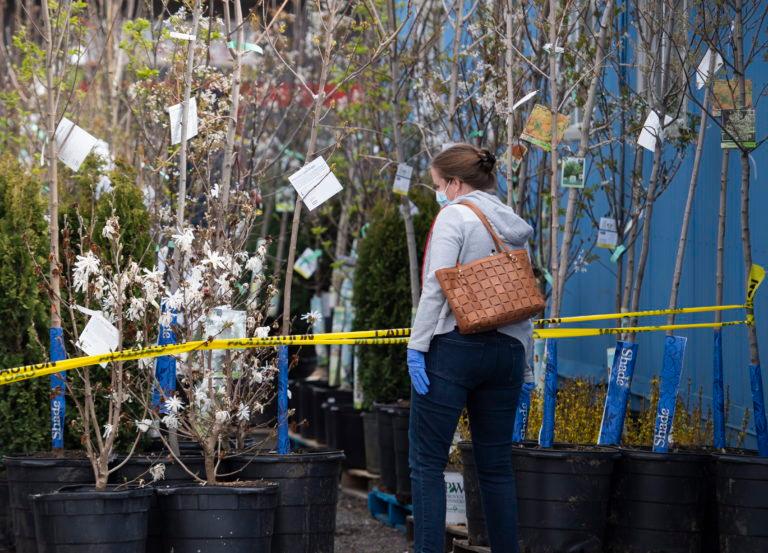Forced to live online, we’re realizing what matters isn’t there
Scott Gilmore: Before, I never thought twice about clicking to Amazon. Now, I click to a local business—the kind of place that sustains our communities.

A customer looks at plants at a garden centre in the Ottawa community of Stittsville, on May 2, 2020 (CP/Justin Tang)
Share
Pandemics (it seems) bring isolation, anxiety and predictions. Which makes sense. Little of this is comforting, and we all want to know how it ends, but we have few precedents against which we can build expectations. So we are reduced to more or less informed guessing. A lot of it.
Earlier on there were the daily forecasts of infection rates and bendable curves. Then we piled on top projections of looming economic collapse. Settling in for weeks of lockdown, politicians and epidemiologists began predicting when it would all end—maybe next week, possibly next month, surely before the autumn.
Closer to home we’ve been predicting when we will run out of food and need to revisit the grocery store, masked and dripping in Purell. At the back of our minds many of us have been trying to calculate our breaking point—is it around the corner or did it already happen weeks ago?
And everywhere, at home, on TV, and in print, we are surrounded by loud predictions that “everything will change” once this is all over. The world will be more divided. Tourism is a thing of the past. Handshakes are done. The office is dead.
On this, I am more sanguine than most. I believe we will almost inevitably revert to the mean. We liked travelling before, we will travel again. Restaurants will reopen. Friends will be hugged.
READ MORE: People are risking death so we can stay home. We need to pay this debt.
Humanity has been through countless pandemics, and while traces always remain, the world eventually goes on. From my own personal experience, returning to West Africa after Ebola, everything looked remarkably the same—other than the painful absence of some dearly missed faces.
But, it is very possible I am wrong and some things will be noticeably different. One of these might be how we shop. Before the pandemic arrived, there were some very large shifts already occurring. Malls have been dying for years, and local shops seemed destined to fade away, too. In their place, the big multinational retailers like Walmart appeared to be unstoppable, and online marketplaces like Amazon destined to become our only source for everything from groceries to car parts.
I had assumed that the coronavirus would only accelerate these changes. Lockdowns had starved the more vulnerable small retailers, leaving only Jeff Bezos to fill the gap. And, given his net worth has increased by billions in the last few weeks, that still remains a real possibility.
However, there are signs something else is happening. Shopify is (as of yesterday) Canada’s biggest company. It is an online retail platform that helps small businesses sell online. And it works, really well—providing services for over 1 million businesses in more than 175 countries.
Shopify released its quarterly results this week, and it contains some interesting data. For example, their merchants are not surprisingly seeing a significant increase in online sales, but that is coupled with a disproportionate increase in local business. In other words, people are buying more online, but they’re also finding local businesses to buy from.
Why? Confined to our neighbourhoods, there is no question we are all experiencing a sudden appreciation for our local community. And with that appreciation comes some fear—for the safety of those who live around us, and for the health of the local businesses. Before, I never thought twice about clicking to Amazon for something. Now, I click to a local business, happily discovering they also have what I need. And, better yet, I can walk down for a curbside pick-up instead of waiting for a delivery.
In fact, in the last 8 weeks, there has been only one thing I was not able to find (online) within walking distance of my house. In some cases it was a little more expensive, but it was in my hands more quickly, and my money ended up with a neighbour, not with a billionaire in Seattle.
Not coincidentally, this echoes a similar dynamic occurring at the national level. Countries are suddenly realizing they rely too heavily on long supply chains that stretch into China, and not on more reliable (albeit sometimes more expensive) local industries. And, like us, our governments are calculating that the extra cost is worth it, if it creates a more resilient community.
This connection to our immediate community, and our appreciation for the businesses that sustain our neighbourhoods, is one thing that Covid-19 has changed, and it may be a change that lingers.
We have been cheering along with our neighbours for local front-line workers. We are nodding at other masked faces who kindly pass us widely on the street. We have been lining up (together but apart) waiting to enter our local grocer. And, we have been realizing that even with the Zoom meetings and digital shopping, we don’t really live online. Our personal world is locatable, finite, and vulnerable. And it appears that this understanding is leading us spend our money differently. If this is becomes a legacy of the pandemic, it would be a welcome one.